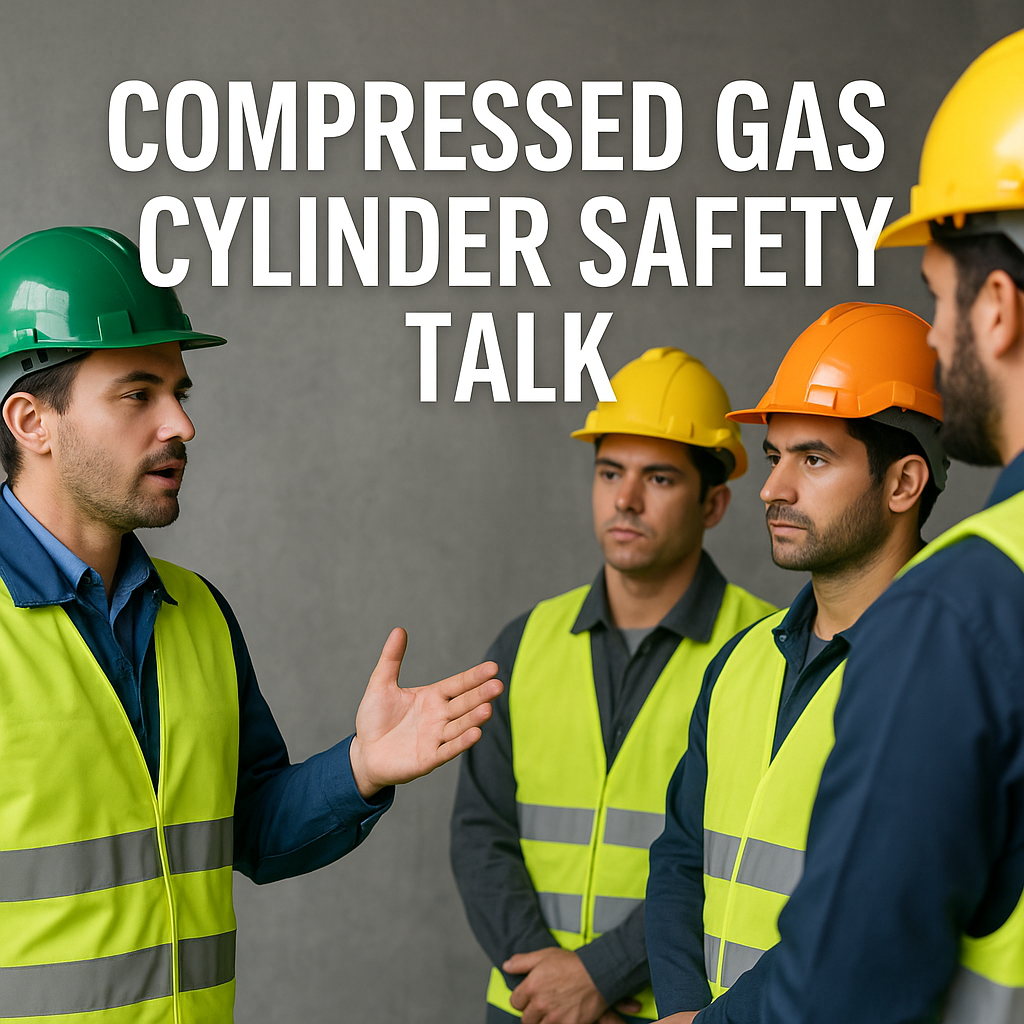
Compressed Gas Cylinder Safety Talk
Role: Safety Officer
Duration: ~10 minutes
Audience: Workers, Technicians, Engineers
Delivery Style: Toolbox Talk / Safety Induction
1. Opening & Greeting
“Good morning everyone,
I hope you’re all doing well and staying safe.
Today’s toolbox talk is about a critical subject that we often see in various workplaces — Compressed Gas Cylinder Safety. Whether you are in construction, maintenance, welding, or lab work, these cylinders are commonly used — and if mishandled, they can pose serious hazards.”
2. Purpose of the Talk
“The purpose of this talk is to ensure everyone understands:
- The hazards of compressed gas cylinders
- The correct storage, handling, and usage procedures
- Emergency actions in case of a gas leak or accident”
3. Why Is It Important?
“Compressed gas cylinders contain gases at high pressure — sometimes over 2000 psi. If a cylinder is damaged, dropped, or exposed to heat:
- It can explode like a missile.
- It can leak toxic, flammable, or oxygen-displacing gases.
- It can cause serious injuries or fatalities.
So it’s not just about compliance — it’s about saving lives.”
4. Types of Gases Commonly Stored
“You might encounter cylinders containing:
- Oxygen – supports combustion (not flammable but makes fire burn hotter and faster)
- Acetylene – highly flammable (used in welding)
- Argon, CO₂ – inert gases (used in welding or labs)
- Nitrogen – displaces oxygen (asphyxiation hazard)
- Chlorine, Ammonia – toxic gases (used in industrial applications)
Each type of gas comes with unique hazards.”
5. Common Hazards
“Here are some key hazards associated with gas cylinders:
- Explosion and Fire – from flammable gases or oxidizers
- Asphyxiation – in case of leaks in confined areas
- Cylinder Rocketing – if the valve breaks off
- Chemical Exposure – from toxic or corrosive gases
- Manual Handling Injuries – due to weight or improper lifting”
6. Safety Precautions (Do’s)
“Here’s what you MUST do:
Storage:
- Store cylinders upright and secured with chains or straps.
- Keep cylinders in a well-ventilated, dry area away from heat sources.
- Separate full and empty cylinders — label them clearly.
- Keep oxygen cylinders at least 20 feet away from flammable gases or separate them with a fire-rated wall.
Handling:
- Always use cylinder trolleys for transportation — never drag or roll.
- Use appropriate PPE – gloves, safety shoes, goggles.
- Check valve caps are in place before moving cylinders.
- Open valves slowly and use proper regulators for each gas type.
- Ensure hoses and fittings are in good condition.
Usage:
- Use cylinders only in upright position.
- Ensure leak tests are done before use (soap solution on fittings).
- Close the cylinder valve when not in use — even if the cylinder is empty.”
7. What NOT to Do (Don’ts)
“Never:
- Drop or strike a cylinder.
- Use makeshift tools on valves or regulators.
- Store cylinders near welding sparks, flames, or direct sunlight.
- Smoke near gas cylinders.
- Attempt to repair a leaking cylinder — tag it and report it immediately.
- Leave empty cylinders lying around — treat them as if full.”
8. Inspection & Maintenance
“Inspect cylinders:
- For damage, rust, or corrosion
- For correct labeling and color coding
- For regulator and hose integrity
If you see a damaged or unmarked cylinder — report it immediately. Only authorized personnel should handle cylinder maintenance.”
9. Emergency Procedures
“If a gas leak or incident occurs:
- Raise the alarm immediately.
- Evacuate the area.
- Do NOT attempt to fix the leak.
- Use emergency shut-off valves (if safe).
- Notify the Safety Department or Emergency Response Team.
In case of fire:
- Use the correct type of extinguisher.
- Do not attempt to extinguish a cylinder fire if the cylinder is involved — evacuate and let fire services handle it.”
10. Worker Responsibilities
“As workers, it is your responsibility to:
- Follow all safety procedures
- Use proper PPE
- Report unsafe conditions or damaged equipment
- Never bypass safety practices for convenience”
11. Final Reminders
“Before we end, remember:
- Compressed gas cylinders are not just metal containers. They hold potential energy and hazards.
- Respect them. Store them safely. Handle them properly.
- Your awareness can prevent a major accident.”
12. Questions & Interaction
“Does anyone have questions or want to share any recent observation or incident involving gas cylinders?
Let’s take a minute to discuss.”
[Pause for interaction]
13. Conclusion
“To wrap it up —
Stay alert.
Use your tools safely.
Look out for each other.
Safety is everyone’s responsibility. Thank you all for your attention, and let’s continue to work safely.”
100 Safety Topics for Daily Toolbox Talk PDF
130+ Safety Talks and Toolbox Talk Meeting Topics
5 Minute Safety Talk on Work at Height